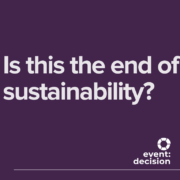event:decision reflects on a recent sustainability-focused trip through Switzerland
Earlier this month, our Head of Sustainable Event Operations, Laura Robinson, joined a group of industry leaders on a journey through Switzerland for Go Sustainable, this exclusive study trip offered the chance to get to know two of Switzerland’s premium MICE destinations; Lucerne & Zurich, in an inspiringly sustainable way. The focus was on first-class sustainability practices, circular economy at events and making valuable contacts. The event began with an early start on 3 April at London St. Pancras International.
Go Sustainable set an example, by taking all three dimensions of sustainability – ecological, social, and economic – when planning and realising the event. Participation, including round-trip travel between London and Switzerland, was generously covered by Eurostar and TGV Lyria, and various suppliers.
The experience brought together destinations, venues, suppliers, and buyers in a unique showcase of what happens when sustainability is embedded at every stage of an event, starting with the journey itself. The four day trip ended back at St. Pancras in London in the evening of 6 April, and Laura shares her experience of the event below.
Rethinking the Commute: Trains Over Planes
From the outset, the trip demonstrated how travel can become part of the experience, not just a means to an end. Taking the train from London to Lucerne via Paris, the group avoided air travel complications, with no long queues, no liquid restrictions, and no tight baggage allowances, the group embraced a relaxed, comfortable, and lower-carbon alternative.
“The journey showcased just how effortless train travel can be,” Laura noted. “We were able to check in smoothly and begin networking with peers from the very start of the day.”
With breakfast onboard, a glass of champagne in hand, and glorious weather, whilst sitting back in pure comfort, soaking up the stunning European countryside, the group enjoyed a sustainability-themed quiz to break the ice. The journey doubled as a networking opportunity which was an ideal start to the days ahead.
A seamless connection through Paris included a coach transfer powered by sustainable rapeseed oil, hosted by a local DMC who added insight with a brief city tour between stations.
Sustainable Venues and Purposeful Choices
That evening’s dinner took place at Neubad Lucerne, a standout venue that beautifully embodies the harmony of environmental consciousness and social impact. A striking example of adaptive reuse and social enterprise. Formerly a public swimming pool, it has been reimagined into a creative venue that supports community-led initiatives and artistic programming which perfectly aligned with the Go Sustainable mission.
The following day continued with a guided walking tour of Lucerne’s historic centre, before boarding the MS Cirrus, an energy-efficient boat designed with reduced fuel consumption in mind. A delicious vegetarian lunch was served onboard, offering guests a taste of thoughtful, sustainable dining, with valuable networking time as the group travelled across Lake Lucerne taking in the breathtaking panoramic views.
The journey then climbed Mount Rigi, in Vitznau, via the iconic cogwheel train, Europe’s first mountain railway, adding a historic layer to the sustainable travel story.
Dinner was hosted at Restaurant Elmira, a Michelin-starred venue focused entirely on plant-based fine dining. “Vegetarian ingredients were transformed into an innovative, high-end culinary experience that artfully blended creativity with flavour,” said Laura. “Sustainability was present not just in the sourcing, but in the ethos behind each dish.”
Workshops, Waste, and the 5 Rs
Saturday introduced a series of hands-on, purpose-driven workshops. Though Laura was assisting in workshop planning and missed the morning run through Zurich, one of the standout sessions of the day was Taste the Waste. Here, participants created a full lunch using surplus ingredients that would otherwise have gone to waste, such a creative and delicious exercise in circular thinking. What began as a creative test turned into a fun and rewarding experience, embraced wholeheartedly by everyone involved.
event:decision then partnered with the Zurich Convention Bureau to deliver a workshop focused on sustainable event delivery. Grounded in our 5 Rs framework – Refuse, Reduce, Reuse, Repurpose, Recycle – we explored some of the common barriers event planners face today and dove into practical strategies for reducing impact and how partnering with social enterprises can help maintain quality without taking anything away from the guest experience.
A key theme was the use of our Impact tool which offers planners and suppliers a transparent, data-backed way to assess and improve the sustainability of their events.
“The Impact Certificate is proving especially popular with both planners and DMCs,” Laura shared. “It gives them a clear and credible way to demonstrate progress and value to their clients.”
The session also encouraged collaboration with social enterprises, showing how event delivery can support local communities, not just minimise harm.
Culture, Connection, and Closing the Loop
The day closed with a guided walk through Zurich’s charming old town before sitting down to a traditional Swiss dinner, accompanied by a live music performance from a local folk band. It made for a memorable, authentic evening with true cultural immersion.
The group returned home on Sunday by train, once again benefitting from the ease, comfort, and low-carbon efficiency of rail travel. “Zurich–Paris–London was just as seamless and relaxed as the outbound leg,” Laura reflected.
Measuring What Matters
Beyond inspiration, the trip delivered measurable outcomes. Our Impact Certificate provided a clear view of the event’s sustainability performance, capturing emissions savings and highlighting areas of excellence.
The forthcoming TRACK report (to be published soon) will take this a step further, offering deeper insights into the environmental and social metrics of the journey. From travel to venue use and food choices, each element was assessed with precision – translating sustainable intentions into actionable data.
Final Thoughts
A big thank you to the Swiss team, Tiffany, Melanie, Reto, Gregory, Anna & Inge and all the many partners involved. Go Sustainable wasn’t just a showcase of good ideas, it was a working example of what sustainability in events can look like when it’s built into the DNA of every decision. From carbon-efficient travel and ethical dining to authentic local engagement, the experience provided a model for how our industry can lead by example.
At event:decision, we believe in delivering more than just green checkboxes. We believe in evidence-based impact, smart partnerships, and intentional design – values clearly reflected throughout the Go Sustainablejourney.
Want to Learn More?
- Explore our Impact Tool and how it can be applied to your events
- Discover Track—our measurement system for emissions, engagement, and more
- Read about our services or contact our team directly for a tailored sustainability plan
Questions? Reach out via hello@eventdecision.com
View the event image gallery from Go Sustainable here!











